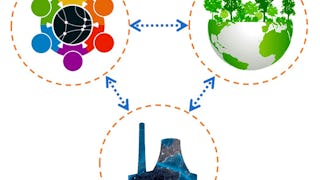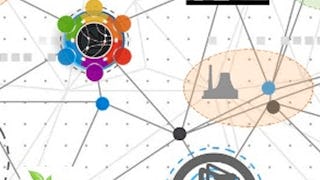Resilience & Leadership: Tools, Methods, & Applications is the second course of the ‘Resilience Engineering and Leadership in Crisis’ specialization. This course offers tools and methods for applying the concepts from the Course 1 (Resilience & Leadership: Concepts, Definitions, & Frameworks) to various applications and disaster scenarios. Systems thinking, crisis management lifecycle, and organizational strategy are presented to help cultivate and strengthen crisis leadership and communication skills. Learners will assess the resilience of a complex system and create a crisis management plan.

Enjoy unlimited growth with a year of Coursera Plus for $199 (regularly $399). Save now.

Resilience & Leadership: Tools, Methods, & Applications
This course is part of Resilience Engineering and Leadership in Crisis Specialization

Instructor: John E. Thomas
Included with
Recommended experience
What you'll learn
Explain how system’s thinking may be applied to a disaster scenario.
Define the key roles and responsibilities of a Crisis Management Team and create a Crisis Management Plan.
Describe how business and organizational strategies may cause or influence a crisis.
Outline key crisis leadership and communication skills across the crisis lifecycle.
Skills you'll gain
Details to know

Add to your LinkedIn profile
5 assignments
See how employees at top companies are mastering in-demand skills

Build your subject-matter expertise
- Learn new concepts from industry experts
- Gain a foundational understanding of a subject or tool
- Develop job-relevant skills with hands-on projects
- Earn a shareable career certificate

There are 5 modules in this course
Welcome to the second course of the Resilience & Leadership series. In this course, we will get started right away by introducing you to systems theory and discussing how systems concepts may be applied to crisis management. You will be presented with systems thinking and mental models to use as tools for working with unanticipated disruptions. We’ll discuss a few example disaster events and apply some of the resilience concepts and frameworks covered so far in this specialization. Finally, you will discover a method for scanning the environment to collect and analyze relevant information using a SWOT analysis tool that can help with identifying potential crises.
What's included
9 videos8 readings1 assignment1 peer review
In this module we’ll take a closer look at systems theory and how systems concepts may apply to a scenario composed of multiple complex systems. We'll review the important content and objectives of a Crisis Management Plan (CMP) and recognize the critical characteristics of Crisis Management Team (CMT) members. Finally, we’ll explore the integration of human and technical resilience capacities and processes in complex critical infrastructure systems.
What's included
7 videos5 readings1 assignment1 peer review
In this module, we'll discuss a case that shows why organizational resilience is important in workplaces. We’ll discuss how some generic competencies are reasonable to expect, others are emergent and appear unpredictable. We’ll also take closer look at the link between corporate strategy and crisis from perspectives of industry, growth, and operations. Finally, we’ll review some of the crisis-related issues that can arise when forming the crisis management team.
What's included
7 videos8 readings1 assignment1 peer review
Crises events challenge leaders to navigate paradoxical conditions. In the context of a crisis lifecycle, leadership actions have direct impact on organizational resilience in relations to unanticipated disruptions. To handle disruptions and paradoxes, leaders must be flexible and adjust their course. In this module, you will learn more about the Resilience Analysis Grid as a tool for assessing the resilience of a system by estimating the constituent elements of the social-technical processes: sensing, anticipating, adapting, and learning.
What's included
8 videos6 readings1 assignment1 peer review
In this final module, we’ll discuss crisis communication. The critical role of current, accurate, and transparent communication with internal and external stakeholders is vital to preparation and recovery. Different styles of communication are needed in different situations to effectively deliver the intended message. We’ll also discuss how crisis events challenge leaders to navigate paradoxical conditions.
What's included
7 videos6 readings1 assignment1 peer review
Earn a career certificate
Add this credential to your LinkedIn profile, resume, or CV. Share it on social media and in your performance review.
Build toward a degree
This course is part of the following degree program(s) offered by University of Colorado Boulder. If you are admitted and enroll, your completed coursework may count toward your degree learning and your progress can transfer with you.¹
Instructor

Offered by
Explore more from Environmental Science and Sustainability
 Status: Free Trial
Status: Free TrialUniversity of Colorado Boulder
 Status: Free Trial
Status: Free TrialUniversity of Colorado Boulder
 Status: Free Trial
Status: Free TrialUniversity of Colorado Boulder
 Status: Free Trial
Status: Free TrialUniversity of Colorado Boulder
Why people choose Coursera for their career





Open new doors with Coursera Plus
Unlimited access to 10,000+ world-class courses, hands-on projects, and job-ready certificate programs - all included in your subscription
Advance your career with an online degree
Earn a degree from world-class universities - 100% online
Join over 3,400 global companies that choose Coursera for Business
Upskill your employees to excel in the digital economy
Frequently asked questions
To access the course materials, assignments and to earn a Certificate, you will need to purchase the Certificate experience when you enroll in a course. You can try a Free Trial instead, or apply for Financial Aid. The course may offer 'Full Course, No Certificate' instead. This option lets you see all course materials, submit required assessments, and get a final grade. This also means that you will not be able to purchase a Certificate experience.
When you enroll in the course, you get access to all of the courses in the Specialization, and you earn a certificate when you complete the work. Your electronic Certificate will be added to your Accomplishments page - from there, you can print your Certificate or add it to your LinkedIn profile.
Yes. In select learning programs, you can apply for financial aid or a scholarship if you can’t afford the enrollment fee. If fin aid or scholarship is available for your learning program selection, you’ll find a link to apply on the description page.
More questions
Financial aid available,

